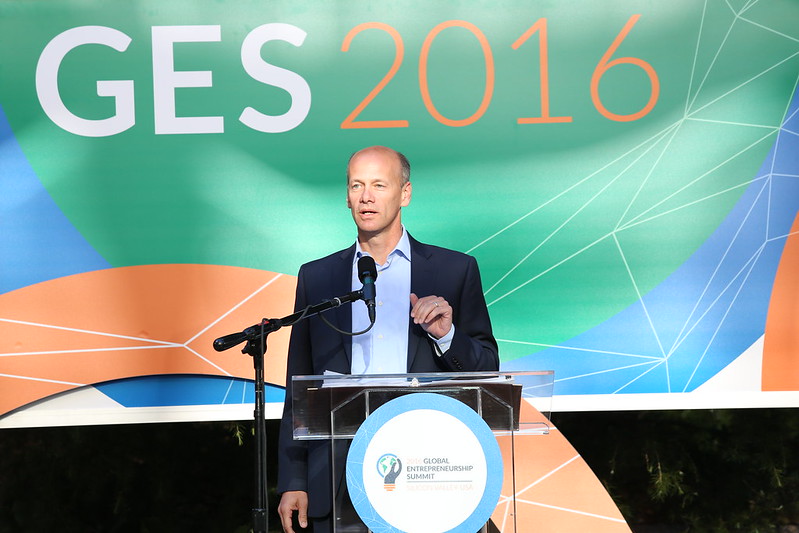
Greg Becker, President and Chief Executive Officer of Silicon Valley Bank and SVB Financial Group, gives remarks at the welcome reception for the Global Entrepreneurship Summit, held on June 22-24, 2016 at Stanford University in Palo Alto, California. [GES Photo/Public Domain]
While the main reason SVB failed was its decision to buy bonds at the top of the market (it got hit when it had to sell), it had also in the past few years further stretched itself by sizably increasing its loans and lines of credit to subprime firms. How much of that would have happened if not for the Biden pot of gold at the end of the green-tech rainbow? A Washington Post story acknowledged that SVB’s weekend collapse initially meant that “many major clean tech companies faced insolvency.” It even accidentally admitted Washington’s role when it noted that many investors were nonetheless hopeful “the infusion of hundreds of billions of dollars in public money” from Washington legislation would “blunt the fallout from the bank collapse.”
The politics doesn’t end there. Even a junior banking regulator should have picked up on SVB’s distress, but that’s apparently a grade above San Francisco Federal Reserve President Mary Daly. She and her team have spent more time of late focused on hypothetical climate risk than the real risk of bank failures. What woke overseer wants to clamp down on the darling of clean-tech banking?
And as for that “infusion” of government dollars, it turns out investors don’t have to wait for grant bucks. SVB had relatively few depositors, but most exceeded the federal deposit-insurance limit of $250,000. Had this been a regional bank in Texas specializing in oil and natural-gas ventures, those depositors would surely be out of luck. But the Biden administration immediately swooped in with an SVB bailout, promising to make all those clean-tech companies whole. Subsidy money, a regulatory blind eye, and bailout bucks—talk about a favored industry. This, while most every other company in the country faces a bevy of hostile Biden regulators and lawsuits.
Some Republicans are blaming the SVB meltdown on distraction—claiming the bank was overly focused on turbofunding climate and social-engineering causes. That’s a bit too convenient. SVB and its clients were doing exactly what Washington invited them to do—chase the money. And one big lesson is that no good ever comes from D.C. attempts to micromanage markets.
Action Line: Any time you’re asked to invest your money to achieve a non-monetary goal, you should be skeptical. In those cases, often you invest, and they win. Stick with me.
E.J. Smith - Your Survival Guy
Latest posts by E.J. Smith - Your Survival Guy (see all)
- Rule #1: Don’t Lose Money - April 26, 2024
- How Investing in AI Speaks Volumes about You - April 26, 2024
- Microsoft Earnings Jump on AI - April 26, 2024
- Your Survival Guy Breaks Down Boxes, Do You? - April 25, 2024
- Oracle’s Vision for the Future—Larry Ellison Keynote - April 25, 2024















